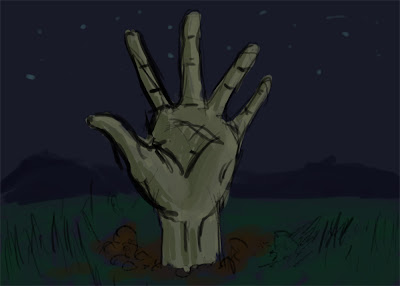 Zombies are motivated for brains like you should be motivated towards your passion in life. Learn from them.
Zombies are motivated for brains like you should be motivated towards your passion in life. Learn from them.Today I'm going to talk about drive and motivation. Now some tough-ass type of coaches, gurus, advisers, and other sorts of people might tell you that you either have it or you don't, but that's not really the full story.
Often times, we have the drive, but we just haven't found the endeavor worthy of that drive. Because our society often promotes certain fields and not others (math and hard science over philosophy, art, and social sciences), often times we label others (and get labeled ourselves) as "unmotivated," "lazy," "unfocused." I find that when it comes to calculus, physics, and drawing subject matters that don't interest me, I am unfocused (hello Bejeweled Blitz!), unmotivated ("hmm, maybe I'll scrub the toilet instead of working on this commission") and just plain lazy ("zzzzzzzzzzzzzz"). On the flip side, give me a day off and tell me to draw monsters and octopi and zombies all day? I'll be glued to my Wacom tablet an easy 8-12 hours no sweat.
So to all those people who tell others that they should be focusing on their work more, go shove it. And yes, all you artists out there with unsupportive parents - I really am telling your parents to shove it.
If you've ever heard "you should focus on XYZ" instead of art, where XYZ is something that you have no interest in, then you should make a deal with that person who just told you that. Pick something that they have absolutely no interest in, and tell them if they focus on that, you'll focus on XYZ. After all, fair's fair.
The point of all this is that just because someone is not interested in a certain field (like their current job) doesn't mean that they aren't driven - it's just hard to push yourself to do something that you essentially hate. The "trick" is that you have to figure out what you are passionate about and go after that. You have to be specific and not generalize. If you are passionate about art, are you passionate about studying 14th century oil paintings, or are you interested in wheatpasting posters around town? Two very different fields, but both would fall into the general category of "art."
Once you find what you love to do, you'll find that life gets a lot more fun, and "work" doesn't seem so much like work. Maybe you won't be able to land that dream job right away, but once you know the concrete details of your dream job, you'll then be able to start taking concrete actions in order to wean yourself off your current job and move to what you really want to do.
The next step is to take a lesson from zombies and learn to be relentless in your passion. It may hurt, it may take a long time, but in the end, when you're truly delving deep into what you love to do, that's when it's going to be all worth it.
What are you passionate about?

